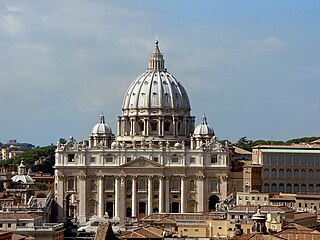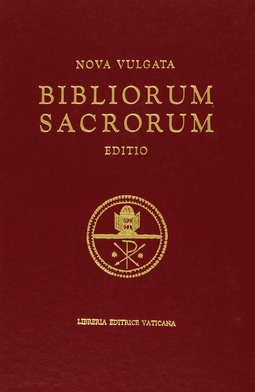
The Roman Missal is the title of several missals used in the celebration of the Roman Rite. Along with other liturgical books of the Roman Rite, the Roman Missal contains the texts and rubrics for the celebration of the most common liturgy and Mass of the Catholic Church.

The Second Ecumenical Council of the Vatican, commonly known as the Second Vatican Council, or Vatican II, was the 21st ecumenical council of the Catholic Church. The council met in Saint Peter's Basilica in Vatican City for four periods, each lasting between 8 and 12 weeks, in the autumn of each of the four years 1962 to 1965. Preparation for the council took three years, from the summer of 1959 to the autumn of 1962. The council was opened on 11 October 1962 by John XXIII, and was closed on 8 December 1965 by Paul VI.

Dei verbum, the Second Vatican Council's Dogmatic Constitution on Divine Revelation, was promulgated by Pope Paul VI on 18 November 1965, following approval by the assembled bishops by a vote of 2,344 to 6. It is one of the principal documents of the Second Vatican Council.

Sacrosanctum Concilium, the Constitution on the Sacred Liturgy, is one of the constitutions of the Second Vatican Council. It was approved by the assembled bishops by a vote of 2,147 to 4 and promulgated by Pope Paul VI on 4 December 1963. The main aim was to revise the traditional liturgical texts and rituals to reflect more fully fundamental principles, and be more pastorally effective in the changed conditions of the times, clarifying not only the role of ordained ministers but the modalities of appropriate participation of lay faithful in the Catholic Church's liturgy, especially that of the Roman Rite. The title is taken from the opening lines of the document and means "This Sacred Council".

The Mass of Paul VI, also known as the Ordinary Form or Novus Ordo, is the most commonly used liturgy in the Catholic Church. It was promulgated by Pope Paul VI in 1969 and published in 1970; it was then revised in 1975, further revised by Pope John Paul II in 2000, and published in a third edition in 2002.

A sacred language, holy language or liturgical language is any language that is cultivated and used primarily for religious reasons by people who speak another, primary language in their daily lives.
Ecclesiastical Latin, also called Church Latin or Liturgical Latin, is a form of Latin developed to discuss Christian thought in Late Antiquity and used in Christian liturgy, theology, and church administration down to the present day, especially in the Catholic Church. It includes words from Vulgar Latin and Classical Latin re-purposed with Christian meaning. It is less stylized and rigid in form than Classical Latin, sharing vocabulary, forms, and syntax, while at the same time incorporating informal elements which had always been with the language but which were excluded by the literary authors of Classical Latin.

The Revised Standard Version Catholic Edition (RSVCE) is an English translation of the Bible first published in 1966. In 1965, the Catholic Biblical Association adapted, under the editorship of Bernard Orchard OSB and Reginald C. Fuller, the Revised Standard Version (RSV) for Catholic use. It contains the deuterocanonical books of the Old Testament placed in the traditional order of the Vulgate. The editors' stated aim for the RSV Catholic Edition was "to make the minimum number of alterations, and to change only what seemed absolutely necessary in the light of Catholic tradition."

The Nova Vulgata, also called the Neo-Vulgate, is the official Classical Latin translation of the original-language texts of the Bible published by the Holy See. It was completed in 1979, and was promulgated the same year by John Paul II in Scripturarum thesaurus. A second, revised edition was published in 1986. It is the official Latin text of the Bible of the Catholic Church. The Nova Vulgata is also called the New Latin Vulgate or the New Vulgate.

The Liturgy of the Hours or Divine Office or Opus Dei are a set of Catholic prayers comprising the canonical hours, often also referred to as the breviary, of the Latin Church. The Liturgy of the Hours forms the official set of prayers "marking the hours of each day and sanctifying the day with prayer." The term "Liturgy of the Hours" has been retroactively applied to the practices of saying the canonical hours in both the Christian East and West–particularly within the Latin liturgical rites–prior to the Second Vatican Council, and is the official term for the canonical hours promulgated for usage by the Latin Church in 1971. Before 1971, the official form for the Latin Church was the Breviarium Romanum, first published in 1568 with major editions through 1962.

The Roman Rite is the most common ritual family for performing the ecclesiastical services of the Latin Church, the largest of the sui iuris particular churches that comprise the Catholic Church. The Roman Rite governs rites such as the Roman Mass and the Liturgy of the Hours as well as the manner in which sacraments and blessings are performed.

Catechesis is basic Christian religious education of children and adults, often from a catechism book. It started as education of converts to Christianity, but as the religion became institutionalized, catechesis was used for education of members who had been baptized as infants. As defined in the Catechism of the Catholic Church, paragraph 5 :
Catechesis is an education in the faith of children, young people and adults which includes especially the teaching of Christian doctrine imparted, generally speaking, in an organic and systematic way, with a view to initiating the hearers into the fullness of Christian life.

The Paschal mystery is one of the central concepts of Catholic faith relating to the history of salvation. According to the Compendium of the Catechism of the Catholic Church, "The Paschal Mystery of Jesus, which comprises his passion, death, resurrection, and glorification, stands at the center of the Christian faith because God's saving plan was accomplished once for all by the redemptive death of himself as Jesus Christ." The Catechism states that in the liturgy of the Church "it is principally his own Paschal mystery that Christ signifies and makes present."

The Mass is the central liturgical service of the Eucharist in the Catholic Church, in which bread and wine are consecrated and become the body and blood of Christ. As defined by the Church at the Council of Trent, in the Mass "the same Christ who offered himself once in a bloody manner on the altar of the cross, is present and offered in an unbloody manner". The Church describes the Mass as the "source and summit of the Christian life", and teaches that the Mass is a sacrifice, in which the sacramental bread and wine, through consecration by an ordained priest, become the sacrificial body, blood, soul, and divinity of Christ as the sacrifice on Calvary made truly present once again on the altar. The Catholic Church permits only baptised members in the state of grace to receive Christ in the Eucharist.
Summorum Pontificum is an apostolic letter of Pope Benedict XVI, issued in July 2007. This letter specifies the circumstances in which priests of the Latin Church could celebrate Mass according to what Benedict XVI called the "Missal promulgated by Blessed John XXIII in 1962" and administer most of the sacraments in the form used before the liturgical reforms that followed the Second Vatican Council.

The term Catholic Bible can be understood in two ways. More generally, it can refer to a Christian Bible that includes the whole 73-book canon recognized by the Catholic Church, including some of the deuterocanonical books of the Old Testament which are in the Greek Septuagint collection, but which are not present in the Hebrew Masoretic Text collection. More specifically, the term can refer to a version or translation of the Bible which is published with the Catholic Church's approval, in accordance with Catholic canon law.
Einheitsübersetzung (EÜ) is a German translation of the Bible for liturgical use in Roman Catholic worship. It is published by the Katholisches Bibelwerk and was compiled from 1962 to 1980 by Catholic theologians with contributions from Evangelical theologians. Collaboration was done on the New Testament and the Psalms. The Evangelical side withdrew support from a project revising the Einheitsübersetzung in 2005.
Pope Francis issued the document Magnum principium dated 3 September 2017 on his own authority. It modified the 1983 Code of Canon Law to shift responsibility and authority for translations of liturgical texts into modern languages to national and regional conferences of bishops and restrict the role of the Congregation for Divine Worship and the Discipline of the Sacraments (CDW). It was made public on 9 September 2017 and its effective date was 1 October of the same year.
Traditionis custodes is an apostolic letter issued motu proprio by Pope Francis, promulgated on 16 July 2021 regarding the continued use of pre-Vatican II rites. It restricts the celebration of the Tridentine Mass of the Roman Rite, sometimes colloquially called the "Latin Mass" or the "Traditional Latin Mass". The apostolic letter was accompanied by an ecclesiastical letter to the Catholic bishops of the world.
Liturgical use of Latin is the practice of performing Christian liturgy in Ecclesiastical Latin. This practice is typically found in the context of liturgical rites of the Latin Church.












